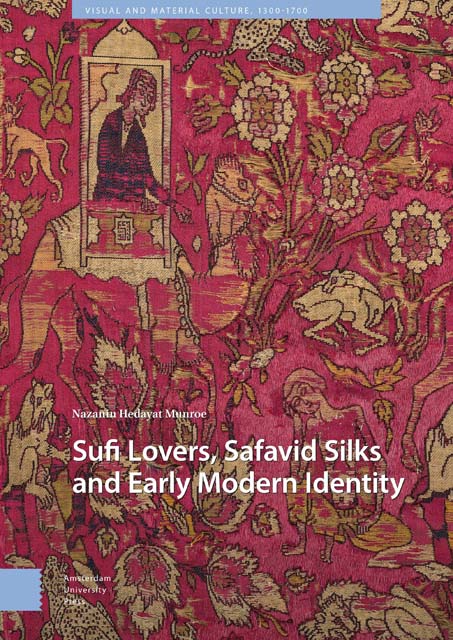Book contents
- Frontmatter
- Dedication
- Table of Contents
- Acknowledgments
- List of Illustrations
- Note on Transliteration
- Introduction: Material Culture and Mysticism in the Persianate World
- Part I
- Part II
- Conclusion
- Appendix A List of Khamsa Silks
- Appendix B Summary of ‘Shirin and Khusrau’ by Amir Khusrau Dihlavi
- Appendix C Summary of ‘Majnun and Layla’ by Amir Khusrau Dihlavi
- Glossary of Textile Terms
- Glossary of Persian and Arabic Terms
- List of Historic Figures
- Index
2 - Dressed as King, Lover and Beloved: Khusrau and Shirin
Published online by Cambridge University Press: 19 April 2023
- Frontmatter
- Dedication
- Table of Contents
- Acknowledgments
- List of Illustrations
- Note on Transliteration
- Introduction: Material Culture and Mysticism in the Persianate World
- Part I
- Part II
- Conclusion
- Appendix A List of Khamsa Silks
- Appendix B Summary of ‘Shirin and Khusrau’ by Amir Khusrau Dihlavi
- Appendix C Summary of ‘Majnun and Layla’ by Amir Khusrau Dihlavi
- Glossary of Textile Terms
- Glossary of Persian and Arabic Terms
- List of Historic Figures
- Index
Summary
Abstract
The romances in the Khamsa of Nizami Ganjavi are introduced in detail, focusing on Khusrau and Shirin. A narrative summary illustrates the relationship between the Sasanian king (r. 591-628) and the Armenian princess as they evolve from love-struck youths entangled in love triangles to the rulers of the Iranian empire. Silks depicting their initial meeting, as Khusrau watches a partially nude Shirin bathing in a stream, are studied in four different textile designs, one by Ghiyath al-Din and three by anonymous naqshbandan (‘textile designers’), and compared to paintings of the same period. The relationship between the gaze, the body and garments as a mode of communicating the inner self of the wearer is discussed as an expression of divine love and human desire.
Keywords: Safavid silk, Safavid figural silk, Safavid narrative silk, drawloom silk, Safavid velvet
Poetry had become a signifier of nationalism more than a hundred years before Nizami’s time. The great poet Abul Qasem Ferdowsi (940-1019) codified the history of Iranian kingship in his Persian national epic, the Shahnama (The book of kings). Presented to the Ghaznavid Sultan Mahmud in 1010 and spanning approximately 30 years in its production, the Shahnama is composed in New Persian, comprised of more than 50,000 rhyming couplets called masnavi. The epic work celebrates ancient Iranian culture and represents a revival of the Persian language in the region, primarily as a rejection of Arab influence following the mid-seventh-century Islamic conquests of Iran.
Ferdowsi’s Shahnama established Persian masnavi as the gold standard of poetry, functioning as the precedent for later poets throughout the Persianate world. Rulers assembled impressive libraries of handmade manuscripts, showcasing their wealth while also presenting themselves in serious contemplation of proper kingship. From the medieval era onward, it became a sign of breeding and erudition in the Persianate world to be familiar with the major literary works through memorization of poetic passages. New poetry was commissioned by the ruling class, and lengthy passages of classic poetry such as the Shahnama and the Khamsa were recited by storytellers at court, a tradition which continued into the early modern period.
The poet known as Nizami Ganjavi (1141-1209) was born Ilyas ibn Yusuf Mu’ayyad in the region of Ganja, once part of Iranian territory (now modern-day Azerbaijan).
- Type
- Chapter
- Information
- Sufi Lovers, Safavid Silks and Early Modern Identity , pp. 53 - 82Publisher: Amsterdam University PressPrint publication year: 2023

